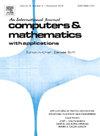非侵入式最小二乘泛函后验误差估计:线性和非线性收敛问题
IF 2.5
2区 数学
Q1 MATHEMATICS, APPLIED
引用次数: 0
摘要
使用最小二乘泛函的后验误差估计器可以用于自适应网格细化和误差控制,即使不是通过相应的最小二乘方法获得数值逼近。这表明了一种通用的非侵入性后验误差估计器的发展。本文提出了一种系统的方法,将最小二乘泛函误差估计应用于不能用最小二乘有限元方法解决的线性和非线性问题。对于用标准拟合有限元法求解的椭圆型偏微分方程,我们将最小二乘泛函最小化,并插入拟合近似以恢复其他物理意义变量。将原始方法的数值近似与辅助恢复近似相结合,构造了最小二乘泛函后验误差估计器。此外,我们引入了一种新的解释,将非侵入式最小二乘函数误差估计量视为组合求解-恢复过程的估计量。这简化了可靠性和效率分析。我们把这个思想推广到一个模型非线性问题。对于一般二阶椭圆方程的自适应算法,以及具有非侵入式最小二乘泛函后验误差估计的模型非线性问题,给出了简单的收敛结果。本文章由计算机程序翻译,如有差异,请以英文原文为准。
Non-intrusive least-squares functional a posteriori error estimator: Linear and nonlinear problems with plain convergence
The a posteriori error estimator using the least-squares functional can be used for adaptive mesh refinement and error control even if the numerical approximations are not obtained from the corresponding least-squares method. This suggests the development of a versatile non-intrusive a posteriori error estimator. In this paper, we present a systematic approach for applying the least-squares functional error estimator to linear and nonlinear problems that are not solved by the least-squares finite element methods. For the case of an elliptic PDE solved by the standard conforming finite element method, we minimize the least-squares functional with conforming approximation inserted to recover the other physically meaningful variable. By combining the numerical approximation from the original method with the auxiliary recovery approximation, we construct the least-squares functional a posteriori error estimator. Furthermore, we introduce a new interpretation that views the non-intrusive least-squares functional error estimator as an estimator for the combined solve-recover process. This simplifies the reliability and efficiency analysis. We extend the idea to a model nonlinear problem. Plain convergence results are established for adaptive algorithms of the general second order elliptic equation and a model nonlinear problem with the non-intrusive least-squares functional a posteriori error estimators.
求助全文
通过发布文献求助,成功后即可免费获取论文全文。
去求助
来源期刊

Computers & Mathematics with Applications
工程技术-计算机:跨学科应用
CiteScore
5.10
自引率
10.30%
发文量
396
审稿时长
9.9 weeks
期刊介绍:
Computers & Mathematics with Applications provides a medium of exchange for those engaged in fields contributing to building successful simulations for science and engineering using Partial Differential Equations (PDEs).
 求助内容:
求助内容: 应助结果提醒方式:
应助结果提醒方式:


